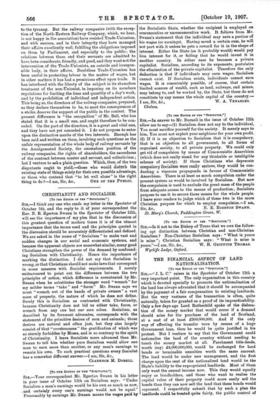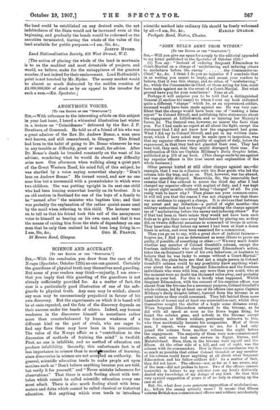THE FINANCIAL ASPECT OF LAND NATIONALISATION.
[To THE EDITOR OF THE " SPECTATOR:1 SIR,—" J. L. C." raises in the Spectator of October 12th a very important point. The only organisation in this country which is devoted specially to promote the nationalisation of the land has always advocated that it should be accompanied by the payment of a fair compensation to existing landlords. But the very vastness of the transaction is often, quite naturally, taken for granted as a proof of its impracticability. Only a few days ago Lord Rothschild spoke of the disloca- tion of the money market that would occur if a demand should arise for the purchase of the land of Scotland, at a cost of at least 000,000,000. And if the only way of effecting the transfer were by means of a huge Government loan, then he would be quite justified in his protest. But I venture to say that the Government could nationalise the land of the country without needing to touch the money market at all. Parchment title-deeds, worth (say) 24,000,000,000, would be exchanged for land bonds or terminable annuities worth the same amount. The land would be under new management, and the first charge upon the rent of the nationalised land would be the State's liability to the expropriated landlords. Most of them only want the annual income now. This they would equally enjoy as bondholders, and those who want to realise the capital value of their property could more easily sell the bonds than they can now sell the land that these bonds would represent. I respectfully submit that by such a plan the landlords could be treated quite fairly, the public control of
the land could be established on any desired scale, the net indebtedness of the State would not be increased even at the beginning, and gradually the bonds would be redeemed or the a.nnuities terminated, leaving the whole of the value of the land available for public purposes.—I am, Sir, &c.,
JOSEPH HvDER.
Land Nationalisation Society, 432 West Strand, W.C.
[The notion of placing the whole of the land in mortmain ie to us the maddest and most detestable of projects, and would, we believe, make for the unhappiness of the greatest number, if not indeed for their enslavement. Lord Rothschild's point is not touched by Mr. Hyder. The money market would be almost as much dislocated by the sudden creation of f4,000,000,000 of stock as by an appeal to the investor for such a sum.—En. Spectator.]











































 Previous page
Previous page